REPORTS
Saffron Offensive in Karnataka
Further emboldened by its victory in the by-elections in 5 out of 8Assembly seats, the ruling BJP has intensified its communal fascist onslaught. At Mangalore, a coastal district is the nerve centre of Sangh Parivar’s saffron offensive. B V Seetaram, Editor of a Karavali Ale, a magazine that had been a bold voice against the BJP Government, was arrested recently on flimsy charges and even displayed in handcuffs. The arrest came on the heels of months of harassment, fake cases, attacks on the magazine’s office and public bonfires of copies of the magazine.
In Mangalore, the Sangh Parivar’s moral policing is not confined to a few incidents. Groups of young people are routinely attacked on the grounds that Hindu women are fraternising with Muslim or Christian men. A bus in which college students were being taken on a trip was stoned on the same grounds. A Hindu school girl visited a Muslim girl, her schoolmate; both were beaten up and the Muslim girl’s home ransacked. Sangh activists boast that mostly, girls ‘behave’ if thrashed and humiliated in public, but it is more difficult to make boys obey the ‘moral code.’
Recently the office of the PUCL’s Karnataka Working President D’sa was attacked by the Bajrang Dal. The inmates of a jail in Mangalore were attacked brutally within the jail premises by Bajrang Dal members, who were later shifted to other jails, without being punished for their acts.
In a shocking incident, a young man Mukarram was killed by army personnel in Bangalore city. Chased by traffic police for ‘drag racing’ on his bike, he had taken refuge on the roof of a house, which turned out to be that of an army Major. The Major’s security staff heard him weeping and speaking to his mother in Urdu on the phone – and shot him dead, claiming they assumed he was a ‘terrorist’. Meanwhile, recently, eight Hindu boys were arrested in connection with a bomb blast in the Hubli court premises last year. Earlier the act was attributed to SIMI and LET by the Hubli police. The state government’s anti-terrorism campaign in schools and colleges is a euphemism for a hate campaign conducted by Sangh outfits.
The state is slowly but surely moving towards communal fascism on the lines of Gujarat.
N Divakar
Employees’ Strike in Bihar
The employees and teachers of Bihar State Govt. have been on strike since 7th January 2009 and till the time of going to the press, the strike continues and has completed a fortnight. On the eve of first day of strike, a torch-light procession was held in Capital Patna and all district headquarters of Bihar on 6th January and the following day witnessed a total halt of all governmental work. According to the official report more than 90 percent employees joined the strike on very first day. A significant section of the primary teachers and all of the shiksha-mitras (para-teachers) stopped their work.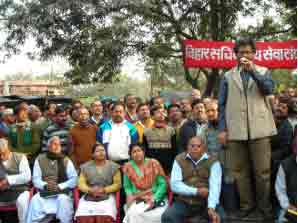 During the fortnight panchayat employment assistants throughout the State also went on strike. The strike is being spearheaded by the joint front comprised of Bihar State Non-gazetted Employees Confederation (Gope faction), Bihar Secretariat Services Federation, Bihar State Non-gazetted Employees Confederation (Yogendra faction) and the Bihar State Primary Teachers' Federation.
During the fortnight panchayat employment assistants throughout the State also went on strike. The strike is being spearheaded by the joint front comprised of Bihar State Non-gazetted Employees Confederation (Gope faction), Bihar Secretariat Services Federation, Bihar State Non-gazetted Employees Confederation (Yogendra faction) and the Bihar State Primary Teachers' Federation.
The State employees and teachers have been forced to proceed on strike to protest the Nitish Government's vacillation in adopting the pay-pattern recommended by Sixth Pay Commission for Central Govt. employees, non-regularisation of teachers-employees working on contractual and daily wages and implementation of the terms of agreement arrived at during the 43-day strike in 2004-05. The Strike has received moral support from Bihar Policemen's Association. Even the Gazetted officials of the State meanwhile have declared to go on strike from January 21. The strike's impact can be felt even in the remotest areas of the State, with daily protests being held.
The Bihar Government issued a "no work-no pay" threat on 19 January, announcing disciplinary action against the striking employees. The employees have defied such threats and are continuing with the strike. CPI(ML) extended its full support to the strike from the very beginning and its Central and State leaders have visited the striking employees and have addressed their meetings and rallies. Comrade Dipankar addressed the mass-meeting of the striking employees in Patna on 19 January.
Uttarakhand Diary
The CPI(ML) was at the forefront of a massive movement protesting the gang-rape and murder in November of a young woman Preeti Sharma of Haldwani on her way back from work. When it became apparent that the police was covering up the crime, a massive movement ensued. 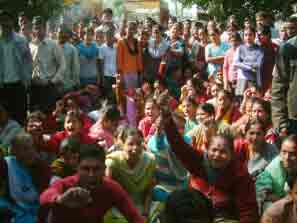 CPI(ML) leader Comrade Bahadur Singh Jangi was made Convenor of the Joint Struggle Committee. The movement continued for a month until the demanded a CBI enquiry signaling that the Uttarakhand State Police had lost all trust before the people. The movement, demanding a CBI enquiry, saw a Haldwani bandh, gherao of the Kumaon Commissionary at Nainital, protest programmes and continued dharna for a month. A Kumaon bandh had been called – but was called off when the State Government, on 17 December, eventually conceded the demand for a CBI enquiry.
CPI(ML) leader Comrade Bahadur Singh Jangi was made Convenor of the Joint Struggle Committee. The movement continued for a month until the demanded a CBI enquiry signaling that the Uttarakhand State Police had lost all trust before the people. The movement, demanding a CBI enquiry, saw a Haldwani bandh, gherao of the Kumaon Commissionary at Nainital, protest programmes and continued dharna for a month. A Kumaon bandh had been called – but was called off when the State Government, on 17 December, eventually conceded the demand for a CBI enquiry.
A massive demonstration was held in Haldwani (Nainital) on 29 December 2008 to demand the status of revenue village for Bindukhatta and against the construction of the Jamrani dam. A large number of women participated. Bindukhatta had been settled after a CPI(ML)-led land struggle during 80s and 90s – and since then people have been demanding legal rights over the land they have been tilling. 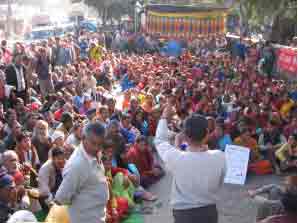
The All India Agricultural Labourers’ Association (AIALA) organised a dharna at the Collectorate in Rudrapur, and submitted a memorandum to the CM, demanding jobs or else unemployment allowance for NREGA job card holders. The dharna was addressed by Com. Girija Pathak, KK Bora, Viren Haldar, Achinto Mandal, Lalit Matiyali, Kusum and Pankaj Vidrohi.
AISA held its fourth Uttarakhand State Conference on 15-16 December 2008 at Dehradun. On this occasion, a seminar was held on “Growing Assaults on Education and Employment and the role of the Student-Youth movement”. Veteran writer Vidyasagar Nautiyal was the chief guest at the seminar and the inaugural session was addressed among others by AISA President and General Secretary Comrades Indresh Maikhuri and Ravi Rai respectively, JNU Students’ Union President Com. Sandeep Singh and Uttarakhand CPI(ML) in-charge Com. Raja Bahuguna. Eighty delegates attended the Conference. The Conference elected a 19-member State Council, with Malti Haldar and Pawan Nautiyal as the State President and Secretary respectively.
Jharkhand Diary
The month-long Pledge Campaign culminated with a massive Rally at Bagodar on Comrade Mahendra Singh's fourth martyrdom day, 16 January, 2009. CPI(ML) General Secretary addressed this rally and called for strengthening the struggle front of the poor against the rulers' united front of loot and repression. The Rally also called for a state-wide bandh on 19 January to force the powers that be to declare fresh elections in the wake of Shibu Soren’s defeat and his rejection by the people of Tamar. At the end a five-point resolution was adopted. On that day, pledge marches were also organised in other places including Ranchi and Chakradharpur.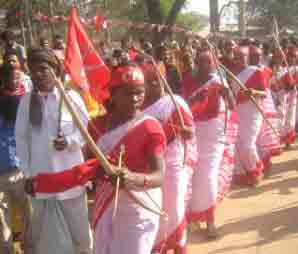
On 19 January, the party through its Jharkhand bandh demanded dissolution of the current Assembly and immediate elections to seek a fresh mandate. The bandh got an enthusiastic response across the state. At fifty places across sixteen districts groups of Party cadres and supporters along with general people marched on streets. In Giridih town, goons allied with Congress leader Sarfaraz Ahmed severely assaulted CPI(ML) leader Comrade Usman Ansari who was leading a march, and CPI(ML) leader Comrade Rajkumar Yadav was arrested. In Obra of Garhwa District Party supporters blockading a road were lathicharged and false cases slapped against them. At Giridih, Birni, Jamua, Dhanwar, Deori, Hazaribagh, Giddi, Heslong, Ramgarh, Bhurkunda, Patratu, Pochra, Bokaro, Chas, Jainamore, Petarwar, Bermo, Nirsa, Govindpur, Sindri, Jharia, Jamtara, Raneshwar, Shikaripara Road, Nanihat, Devghar, Koderma, Ranchi, Lohardaga, Kisko, Barwadih, Ghaghra, Bihnupur, Latehar, Daltongunj, Chhatarpur, Panki, Obra, Nagar Untari, Bhavnathpur and some more places, marches were taken out and national highways were blocked for hours. The successful bundh has compelled other opposition parties also to demand fresh elections.
Earlier on 12 January, on the initiative of CPI(ML), the CPI(M) and the RSP joined a march to the Rajbhawan demanding dissolution of the present State Assembly. 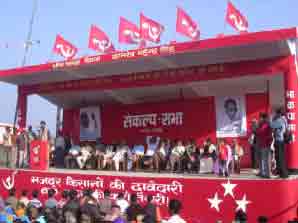
In December, the party had held protests against the police firing at anti-displacement protestors in Kathikund (Dumka). On the call of CPI(ML), the CPI(M), All India Progressive Women’s Association (AIPWA) and Jharkhand Grameen Mazdoor Sabha (JGMS) jointly marched to the Jharkhand State Assembly on 17 December 2008, protesting against the police firing on 6 December 2008, in which one protestor Lakhiram Tudu was killed. The march was led by CPI(ML) leader and MLA Comrade Vinod Kumar Singh, CPI(M) State Executive Member Comrade Prakash Viplav, CPI(ML) spokesperson Com. Jayprakash Minz, AIPWA secretary Com. Sunita and JGMS General Secretary Com. Parmeshwar Mahto. Later the protest march culminated in a mass meeting at the Birsa Chowk in front of the Vidhan Sabha. Leaders and activists from Jharkhand Krantikari Visthapit Sangharsh Morcha (revolutionary struggle front of the displaced) and Ulgulan Front also participated in the protest march.
Prior to the march, on 15 December, the AIPWA held a militant demonstration in front of the Dumka Deputy Commissioner’s office. The march was led by Com. Sunita, AIPWA State President Com. Guni Uraon, State Jt. Secretary Com. Geeta Mandal and Dumka’s AIPWA leader Com. Bitiya Manjhi. The protestors demanded unconditional release of Muni Hansda and her comrades, scrapping of all MoUs including the one for Kathikund power project, and action against the guilty police officials.
Gujarat Initiatives
AICCTU held a dharna on 8 December 2008 at the Collectorate of Sabarkantha District. More than 150 workers and employees participated. The protestors accused the Centre’s UPA and Gujarat’s Narendra Modi Govt. of importing economic recession and terrorism from the US. They said that the communal-fascist Narendra Modi Govt. is defending Sanghi terrorism on the one hand and on the other is trying to exploit the Mumbai terror attacks to manufacture hate and votes. The dharna was addressed by AICCTU and CPI(ML) leaders Comrades Ranjan Ganguly, Dashrath Singhali, Ranjit Singh Rathore among others.
A mass meeting of adivasis against land mafias was held in Punath village of Umargaon Taluka of Valsad District on 9 January 2009, on the issue of the Forest Rights Act. CPI(ML) has been leading a struggle here for land rights of the tribals as per the Forest Rights Act. As an outcome of this struggle 200 acres of land was distributed in Sarigram among 65 tribal families and 65 acres of land was distributed in Jharoli Aklas among 30 families. Still, land mafias supported by the Modi regime continue to illegally control 10-12 acres of land in Sarigram. The meeting was addressed by Central Committee member Prabhat Kumar, Gujarat Party Secretary Ranjan Ganguly, CPI(ML) leader and lawyer in Ahmedabad Lakshmanbhai Patanwadia and RYA leader Amit Patanwadia.
6th AIRPC Conference
The 6th Conference of All India Rail Party Committee (AIRPC) was held at Danapur, (East Central Railway) on 12 – 13 January. 40 delegates attended the conference. Com. Swapan Mukherjee attended the conference as Central Observer. Com. D.P.Baxi, Com. Bahadur Oraon and Com. Sukhadeo also attended the conference. Com. Dipankar Bhattacharya, General Secretary, CPI(ML) sent a message to the Conference. Com. R Sen presented the Draft Report before the Conference, which after discussion, was passed by the house unanimously. A nine member AIRPC committee was elected by the conference with Comrade Rabi Sen as Secretary.
Jute Workers' Pledge
Bengal Chatkal Mazdoor Forum (BCMF), the state level Jute Workers Union of West Bengal, an affiliate of AICCTU, commemorated 16 January 2009 - the day of Com. Mahendra Singh's martyrdom - with a meeting at Moulali Yuba Kendra Auditorium, Kolkata, where Jute Workers from across the state participated. BCMF organised the meeting to reflect on the recent struggles and chart a new course of action after the 18-day-long strike was withdrawn on 19 December 2008. A tripartite agreement was arrived at between all the striking unions, including BCMF and IJMA, the association of Jute Mill owners, and workers resumed the work from 20 December 2008. The meeting was presided over by Com. Nabendu Dasgupta, President, BCMF. At the outset, Com. Partha Ghosh Secretary, West Bengal State Committee of CPI(ML) addressed the jute workers. Atanu Chakravarty, General Secretary, BCMF noted that the employers have again started violating the agreement by not paying ad-hoc Rs.500 against the outstanding dues to all the workmen and called upon the workers to organise militant agitational programmes at mill-level demanding implementation of the agreement. Com. Nabendu Dasgupta pointed out that after opposing the strike, CITU is facing total isolation from the workers. The meeting also resolved to launch mill-wise agitational programmes demanding implementation of the agreement, and to participate in the mass rally of AIALA on 20th January 2009. Com. Basudev Bose, General Secretary of WB AICCTU also addressed the workers and appealed to make the 6th State Conference of AICCTU, scheduled to be held on 15-16 February 2009, a grand success.
 During the fortnight panchayat employment assistants throughout the State also went on strike. The strike is being spearheaded by the joint front comprised of Bihar State Non-gazetted Employees Confederation (Gope faction), Bihar Secretariat Services Federation, Bihar State Non-gazetted Employees Confederation (Yogendra faction) and the Bihar State Primary Teachers' Federation.
During the fortnight panchayat employment assistants throughout the State also went on strike. The strike is being spearheaded by the joint front comprised of Bihar State Non-gazetted Employees Confederation (Gope faction), Bihar Secretariat Services Federation, Bihar State Non-gazetted Employees Confederation (Yogendra faction) and the Bihar State Primary Teachers' Federation. CPI(ML) leader Comrade Bahadur Singh Jangi was made Convenor of the Joint Struggle Committee. The movement continued for a month until the demanded a CBI enquiry signaling that the Uttarakhand State Police had lost all trust before the people. The movement, demanding a CBI enquiry, saw a Haldwani bandh, gherao of the Kumaon Commissionary at Nainital, protest programmes and continued dharna for a month. A Kumaon bandh had been called – but was called off when the State Government, on 17 December, eventually conceded the demand for a CBI enquiry.
CPI(ML) leader Comrade Bahadur Singh Jangi was made Convenor of the Joint Struggle Committee. The movement continued for a month until the demanded a CBI enquiry signaling that the Uttarakhand State Police had lost all trust before the people. The movement, demanding a CBI enquiry, saw a Haldwani bandh, gherao of the Kumaon Commissionary at Nainital, protest programmes and continued dharna for a month. A Kumaon bandh had been called – but was called off when the State Government, on 17 December, eventually conceded the demand for a CBI enquiry.

